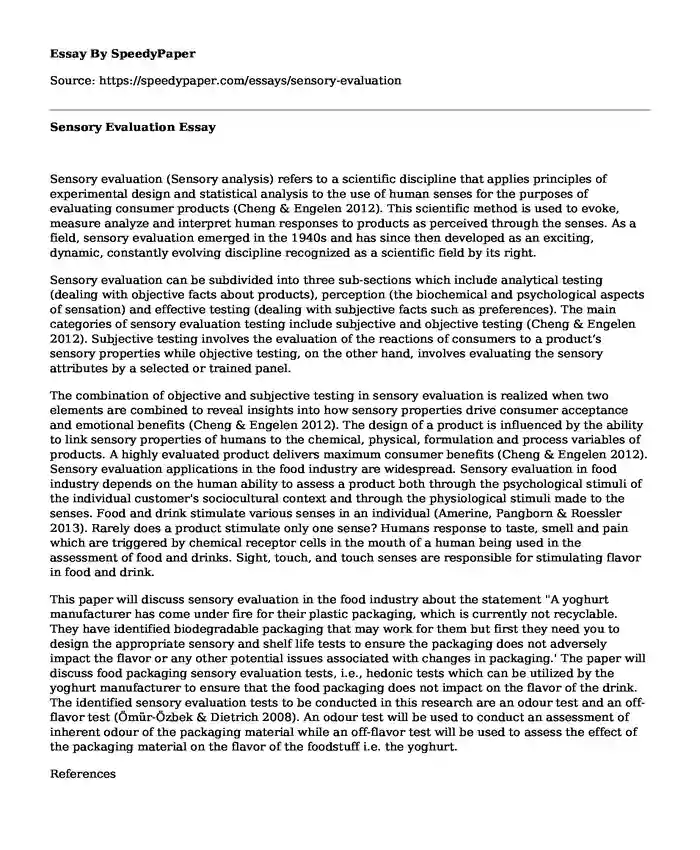Sensory evaluation (Sensory analysis) refers to a scientific discipline that applies principles of experimental design and statistical analysis to the use of human senses for the purposes of evaluating consumer products (Cheng & Engelen 2012). This scientific method is used to evoke, measure analyze and interpret human responses to products as perceived through the senses. As a field, sensory evaluation emerged in the 1940s and has since then developed as an exciting, dynamic, constantly evolving discipline recognized as a scientific field by its right.
Sensory evaluation can be subdivided into three sub-sections which include analytical testing (dealing with objective facts about products), perception (the biochemical and psychological aspects of sensation) and effective testing (dealing with subjective facts such as preferences). The main categories of sensory evaluation testing include subjective and objective testing (Cheng & Engelen 2012). Subjective testing involves the evaluation of the reactions of consumers to a product's sensory properties while objective testing, on the other hand, involves evaluating the sensory attributes by a selected or trained panel.
The combination of objective and subjective testing in sensory evaluation is realized when two elements are combined to reveal insights into how sensory properties drive consumer acceptance and emotional benefits (Cheng & Engelen 2012). The design of a product is influenced by the ability to link sensory properties of humans to the chemical, physical, formulation and process variables of products. A highly evaluated product delivers maximum consumer benefits (Cheng & Engelen 2012). Sensory evaluation applications in the food industry are widespread. Sensory evaluation in food industry depends on the human ability to assess a product both through the psychological stimuli of the individual customer's sociocultural context and through the physiological stimuli made to the senses. Food and drink stimulate various senses in an individual (Amerine, Pangborn & Roessler 2013). Rarely does a product stimulate only one sense? Humans response to taste, smell and pain which are triggered by chemical receptor cells in the mouth of a human being used in the assessment of food and drinks. Sight, touch, and touch senses are responsible for stimulating flavor in food and drink.
This paper will discuss sensory evaluation in the food industry about the statement "A yoghurt manufacturer has come under fire for their plastic packaging, which is currently not recyclable. They have identified biodegradable packaging that may work for them but first they need you to design the appropriate sensory and shelf life tests to ensure the packaging does not adversely impact the flavor or any other potential issues associated with changes in packaging.' The paper will discuss food packaging sensory evaluation tests, i.e., hedonic tests which can be utilized by the yoghurt manufacturer to ensure that the food packaging does not impact on the flavor of the drink. The identified sensory evaluation tests to be conducted in this research are an odour test and an off-flavor test (Omur-Ozbek & Dietrich 2008). An odour test will be used to conduct an assessment of inherent odour of the packaging material while an off-flavor test will be used to assess the effect of the packaging material on the flavor of the foodstuff i.e. the yoghurt.
References
Altner, H., Dudel, J., Grusser, O.J., Grusser-Cornehls, U., Klinke, R. & Zimmermann, M., 2012. Fundamentals of sensory physiology. Springer Science & Business Media.
Amerine, M. A., Pangborn, R. M., & Roessler, E. B. (2013). Principles of sensory evaluation of food. Elsevier.
Chen, J. & Engelen, L., 2012. Food oral processing: fundamentals of eating and sensory perception. John Wiley & Sons. Goody, J., 2002. The anthropology of the senses and sensations. La Ricerca folklorica, pp.17-28.
Omur-Ozbek, P. and Dietrich, A.M., 2008. Developing hexanal as an odor reference standard for sensory analysis of drinking water. Water research, 42(10-11), pp.2598-2604.
Cite this page
Sensory Evaluation. (2022, Nov 23). Retrieved from https://speedypaper.com/essays/sensory-evaluation
Request Removal
If you are the original author of this essay and no longer wish to have it published on the SpeedyPaper website, please click below to request its removal:
- Toyota Company - Marketing and Business Essay Example
- Kurama Tribe Essay Example
- MATLAB Essay Example
- Essay Sample: E-learning vs. Traditional Education
- The United Nations was primarily formed as the successor to the League of Nations, which ended its operations after it was defeated in stopping World War II. During its creation, the U.N. began only with 51 member states, but today it is made up of 193 members and is headquartered in the New York City (Mingst & Karns, 2016). Significant initiatives run by the U.N. include providing humanitarian services to a large number of a population across the world, offering emergency food and medical assistance as well as solving conflicts by effective options to maintain peace. Besides, few years after its formation, a number of meetings were conducted where the main agenda was to draft a post-war charter that accurately outlined the most significant roles of the U.N. The membership rules were delineated on the permit where the membership was open to any peace-loving nation that accepted and was willing to undertake the responsibilities contained in the charter as well as the judgment of the organization (Assembly, 2010). The organization is typically structured into five principal organs which include the General assembly that is mainly concerned with the policy-making of the U.N., the Economic and Social Council that primarily concentrates on the environmental, social and economic issues associated with the development goals internationally. The third one is a judicial organ namely the international court of justice, which solves conflicts between members and offers advisory opinions to the organization (Mingst & Karns, 2016). The trustee council was also formed to ensure the self-governance of eleven territories, the UN Secretariat that acts as the administrative organ and lastly the Security Council, whose primary objective is to maintain international peace and security.
- Research Paper on Blue Economy
- Essay Sample on Physical Manifestations of Alzheimer's
Popular categories





